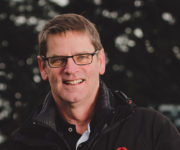Meet the Match
A Mongolian Leader on a Special Mission
It was three years ago when a job posting in the newspaper for the national director of Special Olympics Mongolia caught the attention of Bolormaa Purevdorj. With a successful career as a public health professional, Bolormaa was not actively seeking a new job. But she had always dreamed of making a big impact for young people in her country. Instinctively, she responded to ask about an interview.
“My motivation in life has always been to see happiness on children’s faces,” Bolormaa says. “Children are the first members of our communities. That is why I chose public health, and that is why I consider myself very lucky to be on this path now.”
For Bolormaa (the Mongolian name for “Crystal”), the job was her first experience working in the sports world.
As a girl in Sukhbaatar, a small city on Mongolia-Russia border, Bolormaa loved sports, especially loved running in the mountains and playing basketball. But she developed a passion for medicine and put sports to the side. In 1999, she earned a bachelor’s degree in general medicine and later completed a residency in dermatology and esthetics from the Mongolian National University of Medical Sciences. Since the early 2000s, Bolormaa has worked on public health and disease prevention initiatives for World Vision, Peace Corps Mongolia, the National AIDS Foundation, and the National Public Health Institute, among others. In 2008, she also earned a master’s degree in international development from Kobe University in Japan.
Launched in 2013, Special Olympics is still a young organization in Mongolia. In fact, Bolormaa was unaware of the its presence in the country until reading the job posting. However, she has always known about the difficulties faced by people with intellectual disabilities when trying to access social services. Her uncle has an intellectual disability and another close family member was born with Down syndrome.
“I want to empower special children so they can become community leaders, and sport is a really important way of doing this,” Bolormaa says. “We measure how our athletes begin to lose weight and improve their health as they participate. This improves their self-esteem, self-confidence, and regular class attendance, too. The kids then start to see themselves as role models and want to help others.”
Bolormaa’s key focus with Special Olympics is advocacy—“protecting human rights and the rights of our children,” in her words. She has accomplished this goal by creating an informal network among organizations working with the disabled community, and by producing a documentary on the importance of special education in schools. Currently, services for children with intellectual disabilities are concentrated in the capital, Ulaanbaatar, with four specialized schools serving approximately 1,000 children, according to Bolormaa. In Mongolia’s countryside, special schools and access to health and social services access are even more limited.
With official statistics on intellectual disabilities in Mongolia lacking, Bolormaa wants to play a role in conducting this important research. In 2015, she started a new program to screen incoming athletes and found that more than 90 percent of children needed urgent dentistry treatment and were affected by other treatable conditions. She is now trying to introduce a cost-free program to meet these needs in collaboration with local government, private dentistry clinics, and NGOs.
Altogether, Bolormaa says that Special Olympics has reached 1,600 athletes in the capital and six other provinces where the organization began new competitions.
‘We want to expand to eastern and southern Mongolia, were countryside children are largely ignored,” Bolormaa says. “I’ve seen young children who win medals in our competitions and how they run to their school directors’ offices to show them off with great pride. There is a big impact that we can make.”
With Special Olympics International’s support grant ending in 2018, one of Bolormaa’s key priorities was to secure organizational funding for the future. Outside of Special Olympics, the Paralympic Committee, and Achilles International, children with disabilities have few other opportunities to access sports in Mongolia. Bolormaa believes advocacy to government and private companies is the key to sustainability.
Through the U.S. Department of State Global Sports Mentoring Program, Bolormaa worked with mentors from Special Olympics-Washington (SOWA) to achieve her program goals. Engaging more than 14,500 children with its activities, the organization counts on a volunteer network of 8,000 people committed its diverse sports programs year-round. Its success is supported by strong collaboration from local and national organizations, and vital expertise in marketing and fundraising. Dave Lenox, president and CEO of SOWA, has spent almost 30 years with the Special Olympics at the local and international level. He and his team guided Bolormaa as she learned from experts as about how to ensure Special Olympics Mongolia’s long-term sustainability and success.

